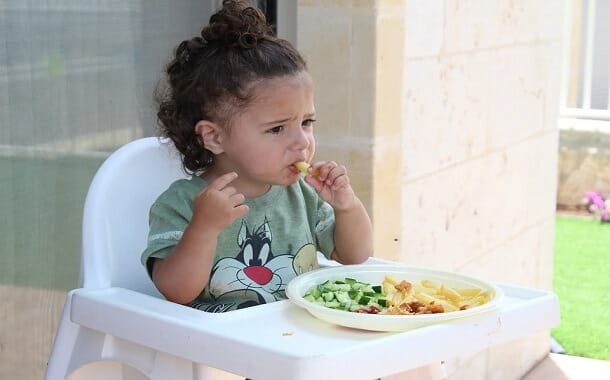Baby Food Cost
Last Updated on December 27, 2023
Written by CPA Alec Pow | Content Reviewed by ![]() CFA Alexander Popinker
CFA Alexander Popinker
At the beginning of his life, the baby will drink only milk, his digestive system not being fully developed just yet. During the first year of life, especially after the age of 4-6 months, the child will begin the diversification, parents introducing cereals, vegetables, fruits, and meat in his diet. It is very important, however, that they take into account absolutely all the pediatrician’s advice regarding the correct nutrition of the child so that the baby develops very nicely and is healthy.
Baby food in jars is one of the safest and most convenient ways to feed babies after they begin to diversify their diet. As you may know, many parents choose the food in the jar instead of the one prepared at home for various reasons: lack of time, lack of healthy alternative sources, lack of inspiration and information, or convenience.
How much does baby food cost?
The cost of baby food can vary wildly depending on what you choose. The average family will pay somewhere between $50 and $120 monthly.
One 16 ounces box of Gerber Infant Cereal that costs around $5 would be enough for one month at the beginning of diversification. As the child grows, you would need one every week.
You may be surprised to find out that you will spend between $40 and $85 on baby food for your child if you buy from Gerber Baby Food. This includes foods like pureed bananas, apples, and green beans, which usually come in two-packs at around $2-$2.50 per pack. You will need 2 to 4 containers of this if your child is 6 to 12 months old.
Gerber’s fruit puffs and melts are a great way for new parents to introduce solids in their baby’s diet. They come with vitamins, minerals that babies need now more than ever. The cost of these snacks is around $3 to $5.
The cost of baby formula can vary depending on the brand and type. In the first year, expect to pay from $50 to $110 per month for powdered infant formulas and $70 to $90 per month for the liquid ones.
Mint.com shows that making the food on your own can cost you as little as $0.50 per serving, while store-bought organic foods will set you back to a whopping $0.80 per serving.
| Brand | Price Range |
|---|---|
| Ellas Kitchen Baby Food | $1.50 to $2 per pouch |
| Beech-Nut Organic Baby Food | $1.50 per jar |
| Goya Baby Food | $1 per 4-ounce jar |
| Gerber Baby Food | $1 to $1.50 per jar |
| Holle Baby Food | $10 to $14 for 250g |
| Heinz Baby Food | $4 to $6 per packet |
| Sprout Organic Baby Food | $10 per 5 pack |
| Nestle Baby Food | $4 to $6 per 14 ounces |
What are the extra costs?
Organic food is more expensive than conventional. Plan on spending $25 to $45 extra per month if you buy only organic. A jar of organic baby food may cost anywhere from $2.5 to $4 and up.
It is important to know the food preferences of your baby, so you can feed them with a variety. Some babies need specific types of foods due to allergy issues. For instance, expect to pay more for soy products.
You might also like our articles about the cost of baby diapers, prenatal vitamins, or well-baby doctor visits.
Baby food makers that cost $65 to more than $155 are common in the market today. Most of them have several settings and offer complete control over what you’re cooking for your baby, which is great if they’ll be eating only one type of vegetable per feeding session.
When does the diversification of baby food begin?
Diversification can start at 6 months, and before you start it is important for the baby to show the following signs:
- he can sit on his bottom alone and keep his head straight;
- he coordinates his hands, eyes, and mouth well so that he can look at the food, grab it with his hands and take it to his mouth on his own;
- he no longer has the reflex to reject food with his tongue, which would prevent him from swallowing food.
Introducing solid foods to the baby
The American Academy of Pediatrics has concluded, following several studies, that it is not necessary for food to be introduced into a baby’s diet in a specific order. Between 6 months and 8 months, the little one can try dishes and products from several food groups.
To make things easier for you, below is a list of foods recommended depending on the baby’s age:
- 4 to 6 months: apples, bananas, pears, sweet potatoes, pumpkin, cereals;
- 6 to 8 months: apricots, nectarines, plums, peaches, carrots, peas, zucchini, turkey, chicken;
- 8 to 10 months: melon, cherries, figs, grapes, kiwi, broccoli, cauliflower, beets, eggplant, bell peppers, potatoes, beef, pork, eggs, pasta, cream cheese, yogurt;
- 10 to 12 months: oranges, mandarins, clementines, strawberries, beans, tomatoes, spinach, corn, fish, venison meat, cow’s milk.
What details should I follow when buying baby food in jars?
 Glass containers (jars) must be tightly closed, with no traces of product leaking from the lid.
Glass containers (jars) must be tightly closed, with no traces of product leaking from the lid.
The lid of the product must not have a convex center on which you can press so that it flattens.
The jar label must be intact, and the warranty period must be visible and correct.
The label must contain the age recommendation: from what age that product can be introduced in the baby’s diet.
The label should specify the gluten or lactose content – you should be very careful about this, especially if your baby is suffering from intolerance to any products.
You must pay attention to the entire list of ingredients printed on the label; try not to feed the baby with food that contain more than one new ingredient. If, for example, you want to include a little pear in the diet, do not choose a jar that contains a mixture of pear and mango if the little one has not eaten mango just yet.
How can I save money?
You can save some money by buying baby food when it’s on sale. You may want to stock up and buy more than you need so that your family has enough for a while, as these sales happen only once or twice per month.
Making your own baby food can be a lot of work, but it’s also cheaper and healthier than buying store-brand varieties.
Store brand baby food is often just as good, if not better than the name brands. Don’t be fooled by expensive advertising campaigns from big corporations trying to convince you that their product has some exclusive ingredient that will make your child healthier.
It’s a good idea to know whether or not you can buy baby formula with food stamps. Yes, it is possible and allowed under SNAP (The Special Supplemental Nutrition Program for Women, Infants and Children). This program provides nutritional support that includes milk-based infant formulas such as soy or rice blends, cereal bars or juice boxes.
Baby food coupons are a great way to save on the high cost of good for your little one. You can find them in newspapers and online through simple searches, making it super convenient.


Leave a Reply
Want to join the discussion?Feel free to contribute!